Do you want to buy an Ancestry DNA test while keeping your details anonymous?
This article looks at your anonymity and privacy options with Ancestry. We’ll walk you through how to limit personal details shown to your DNA relatives.
We also look at whether being completely anonymous is possible.
What Your DNA Relatives See On Ancestry
When Ancestry processes your DNA test, you have the option to view your DNA relatives in their customer database.
If you opt into this feature, your relatives will also see some details about you.
Choosing to display full names
Here is the display of one of my DNA matches.

Yes, I deliberately searched for a “John Smith” in my list for this example. But many of my relatives have distinctive or unusual first names or surnames.
John Smith has deliberately chosen to show his first and last name. But that’s a choice. He could have taken other options.
First name and initials
In the example below, Connie has chosen to show a first name and an initial for a surname.

This option is actually uncommon in my list. I’m more likely to see initials for both first and last names.
Only initials
In this example, the Ancestry tester has chosen to show only initials. I probably have several H.B.s in my list.

Nicknames
Depending on your circumstances, you may be thinking that even initials are revealing. But you can get even more anonymous than that!
Some of my DNA relatives like to use a nickname that must have some meaning to themselves, but don’t mean much to me!
Does this guy like to paddle his canoe?

Display name, age, join date, and other details
I may have solved your privacy concerns by showing you don’t have to reveal your full name.
However, your profile may also show your age, when you signed up to Ancestry.com, and other details.
We’ll get to hiding these details later in this article.
Credit card details and home address
Ancestry has my credit card details and my home address where I told them to send the DNA kit.
Of course, they don’t show these account details to other customers.
Some people don’t want the company to have access to this information. If you’re that hardcore about your anonymity, I’ll address some possible actions in a later section.
But first, let’s look at why people want to protect their anonymity.
Why Do You Want To Do An Ancestry DNA Test Anonymously?
I’ll assume in this section that your motivation isn’t because your DNA would incriminate you in a serious crime.
Instead, most people have concerns about one or more of the following situations:
- You are trying to identify your birth family
- You are worried that a family secret will be unearthed e.g. a half-sibling
- Your DNA being used against you e.g. by health insurance companies
Let’s look at each issue in turn.
Protecting Privacy While Researching Birth Family
If you are adopted or have unknown parentage, it’s reasonable to want to approach your research from a position of privacy.
Your list of DNA relatives on Ancestry may show first cousins or even a half-brother or sister.
The last thing you may want is to be contacted on Facebook by a surprised relative who saw you pop up on their Ancestry list.
The solution here is to privatize your name and other identifying details. You can choose to display initials or a nickname to your relatives. We’ll cover the exact steps later.
This gives you time to move at your own pace.
Bear in mind that you may receive an inquiry through the Ancestry messaging system.
“Hello. Ancestry says we are first cousins. May I ask you who you are?”
If, when, and how you choose to reply is up to you.
The key here is that you are in control of what can be an emotional rollercoaster.
In time, you may decide to change your display profile to show your full name. It’s up to you.
Protecting Privacy If Family Secrets Are Uncovered
The dream for people researching their birth family is that a helpful half-sibling or first cousin shows up on their list of relatives.
This may be an unwanted surprise for others. You may feel you’re in an awkward position if you stumble across a secret kept by your known relative.
You have the option of protecting your privacy by using initials or a nickname (detailed steps in a later section).
If you create a family tree on Ancestry, you should also make it private.
But I hope you would be kind to relatives researching their genetic history.
Many Ancestry testers get great satisfaction through helping a relative on their path to knowing their identity.
Protection From Your Ancestry DNA Results Being Used Against You
The most common concern here is that health insurance companies will somehow get hold of your Ancestry DNA results and use them to your disadvantage.
The fear is that when you apply for health insurance, they’ll be scouring your chromosomes behind the scenes:
”John Smith of Poughkeepsie? Wow, look at position 920,020,141 on his eighth chromosome. Let’s add a gigantic premium to his insurance bill”.
I should point out here that this kind of genetic discrimination is against the law in the United States and other Western countries where this could be an issue.
Aside from that, I’ve written a separate article on whether Ancestry sells your DNA results.
In summary:
- Ancestry.com doesn’t sell DNA results to insurance companies.
- You can choose not to participate in their research projects with third parties
- If you allow your DNA results to be used in research, your personal information is not included
Why Your DNA Can’t Be Completely Anonymous
I see some articles discussing how to do anonymous DNA tests by cloaking your payment details or home address. I’ll address this in the next section.
However, it’s important to understand that you cannot keep your DNA completely anonymous. This is even if you don’t do an Ancestry DNA test yourself.
How is that possible? Well, you can be identified by DNA if your sibling or even a first cousin purchases an Ancestry DNA test.
When your first cousin reveals your identity
If it’s your first cousin, then law enforcement agents have some genealogy work to do.
They will walk back through two generations of birth records to get to your grandparents.
Then they walk forward through marriage and birth records to identify all the children of your grandparents’ children. Of course, you are one of these birth records.
This is how the FBI and their consultant genealogists caught the Golden State Killer. He wasn’t fool enough to do a DNA test. But one of his relatives did the deed.
Now that you understand that your DNA identity can’t be completely anonymous, let’s look at ways to protect your privacy on Ancestry.
How To Protect Your Privacy With DNA Relatives On Ancestry
The ultimate privacy protection is to opt-out of sharing your profile with DNA matches in the Ancestry database.
However, this means that you won’t see your own list of DNA relatives.
If you’re only interested in your ethnicity estimates, then turn off DNA matching.
But let’s assume that your goal is to research your family history so you want to opt into this part of Ancestry.com. Let’s walk through how to privatize your display details.
Your display name
Use the drop-down menu beneath your account name to choose “Account Settings”.
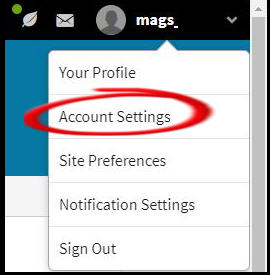
The top section of the Account Settings page has your main account details. Here, it’s the “Username” that is shown to your DNA relatives.
Click the “Edit” link to change what is displayed.
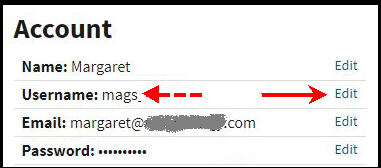
You’ll actually have to click an Edit link twice to get to where you want.
On the edit page, you can pretty much put in anything you want. There are a few rules to length and you can’t use symbols.
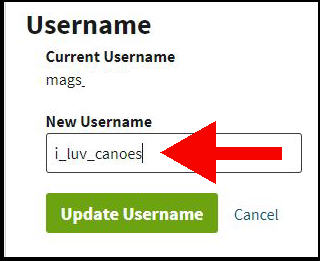
Public profile
The next thing to do is to edit the rest of your profile.
Click on “Your Profile” in the dropdown menu under your account name.
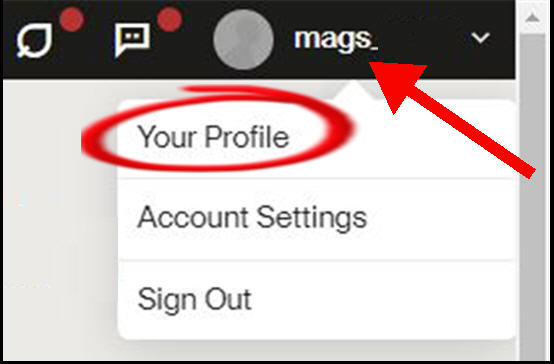
Click the Edit button to edit your profile details.
You don’t edit your display name here (see the previous section on how to do so).
But you wish to remove details about your age and location.
Here is a shortened version of the edit page:
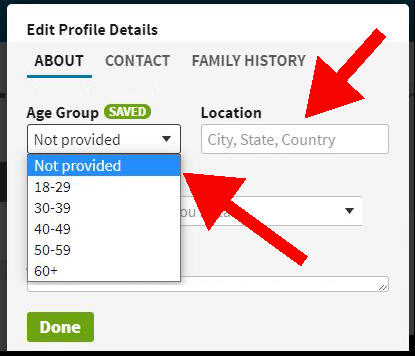
Other Ways That Other Members May Find Your Profile
Apart from matching with your DNA, there are two other common ways that Ancestry members may find your profile.
There is a search page for people with an account that lets them search for other Ancestry members. They will only see your public profile. We described in the previous section how to control what is shown.
If you choose to create a family tree on Ancestry, then other members may find it when searching for historical people as they build their own trees. Every tree has a link to the owner’s profile.
How To Test With Ancestry Anonymously (Nearly)
If you read the earlier section on how your DNA can’t be completely anonymous, then you understand that you may not be able to hide from law enforcement.
Having said that, let’s walk through some actions you can take to cloak your identity from Ancestry.com as a company.
Avoid using your personal credit card
Cash is the most anonymous payment method, but how do you engage Ancestry in a cash transaction?
One straightforward way is to buy the test at a genealogy conference. Ancestry often has marketing booths at major conferences where you can purchase a DNA kit with a stack of notes.
Ancestry also uses Amazon as a provider. You can buy an Amazon gift card with cash and keep payment away from Ancestry altogether.
You may prefer to use PayPal over a credit card, but Amazon doesn’t accept direct payments with PayPal. Check out these workarounds to using PayPal on Amazon.
We have more advice on purchasing through Amazon in our article on the cost of Ancestry DNA kits.
Avoid using your home address for delivery
This should be easy enough in the United States and other western countries.
You’ll probably find several local parcel-collection services that will accept and store a delivery from Ancestry.com.
I can think of at least one other reason for someone wanting their DNA to be anonymous: a man has fathered children out of wedlock and doesn’t want to be “found” and forced to pay child support.
Another reason for anonymous testing is because of data leaks. Ancestry may say they don’t SELL the DNA data but what large website hasn’t been hit with data leaks/breaches? If the banks can’t keep your data secure, why would anyone assume Ancestry can?
Good point. There have been some data breaches on DNA sites in recent years, and Ancestry had a small one.
From New York Times:
It’s impossible to guarantee who will and won’t be able to see and use that information, now or in the future.
Even if you’re paying only for an ancestry test, many consumer-oriented genetic testing companies can analyze biomedical markers in your DNA, as well. And it’s becoming more and more evident that your choices about what information to share may not only affect you but may also have implications for your relatives, no matter how distant.
People interested in testing kits have to decide whether they trust these companies with their genetic information. “We’re in an environment in which we don’t have rules about big databases, who accesses them and under what circumstances,” said Arthur L. Caplan, director of the Division of Medical Ethics at New York University’s School of Medicine.
These companies are not subject to the HIPAA laws governing the privacy of your health and medical records. Blackstone Group, the largest private equity firm in the world, announced a deal to acquire a roughly 75% ownership stake in AncestryDNA
Thank you for compiling this information. My plan is to create a new email address and use a pseudonym to submit the test. My concern is my genetic data being linked to me during a data breach or eventual sale of data.